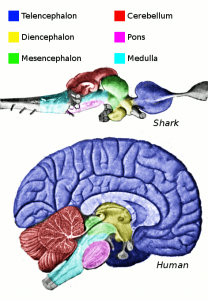 I’m always a sucker for pseudo-scientific theories about how babies think, so when something actually scientific comes along I get extremely excited. This one comes from my friend Jeff Wise, author of “Extreme Fear,” who observes that his 16-month-old son, Rem, “seems to grasp the purpose of objects more easily than the details of how they must be physically manipulated.” He puts his spoon in his mouth sideways, a dustpan on the porch upside-down, and his snow boots next to his feet.
I’m always a sucker for pseudo-scientific theories about how babies think, so when something actually scientific comes along I get extremely excited. This one comes from my friend Jeff Wise, author of “Extreme Fear,” who observes that his 16-month-old son, Rem, “seems to grasp the purpose of objects more easily than the details of how they must be physically manipulated.” He puts his spoon in his mouth sideways, a dustpan on the porch upside-down, and his snow boots next to his feet.
The infant mind, then, reverses the famous Bauhaus dictum that “form follows function.” An adult dust-pan designer would start by thinking along these lines: I’ll need a surface that can intersect evenly with a flat surface, therefore the leading edge of my dustpan will have to be flat. To Rem, these considerations are incomprehensible. A dustpan works because it is a dustpan. A spoon works because it is a spoon. To him, function precedes form.
Check out his blog—jeffwise.wordpress.com—to learn about “scale error,” watch a cute-funny-freaky video of oversized toddlers, and find out what Rem does with a cardboard box.

Interesting to connect this with your post about learning language — I tried Rosetta Stone myself and was very frustrated by it. Since kids learn language so effortlessly, it would be great to emulate them, but I suspect our brains are wired to differently for that approach to work. We give them a great morass of undifferentiated verbiage to process and they automatically sort out the rules — regular present-tense verbs with a third person singular subject take an ‘s’ at the end, that sort of thing. For a grownup, that sort of detective work is hard. I was using Rosetta Stone to learn German, and believe me, that language is full of a buttload of arcane rules. Unless you’re a CIA cryptographer, you’re better off just being told what they are.
Intriguing stuff. I’m in a state of perpetual fascination with the workings of our imminent (2 months-ish) Baby Grrl!™’s mind. I’m in the midst of reading Charles Fernyhough’s thoroughly engrossing, A Thousand Days of Wonder, “A scientist’s chronicle of his daughter’s developing mind” from birth to age three. I highly recommend it.
You guys should do a review of Your Baby Can Read.
Pingback: Easy As 1, 2, 3 « THE FATHER LIFE Likes…